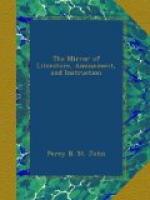The most splendid painting in the gallery is No. 7, The Departure of the Israelites out of Egypt, by Mr. Roberts. In the performance of this work, the painter has evidently endeavoured to imitate Martin’s compositions. The picture, viewed at a little distance, is certainly grand and imposing; on a near inspection, however, we look in vain for the exquisite finish, and the characteristic expression so universally admired in Mr. Martin’s works. We advise Mr. Roberts, if he pursues this class of painting, to unite finish with his bold effects—for attention in this respect will prove the denouement of his pictures. No. 188, Erle Stoke Park, the seat of G. Watson Taylor, Esq. M.P. by Mr. Stanfield, is a very delightful picture, being remarkably chaste and clear in the colouring. No. 404, Mattock High Tor, by Mr. Hotland, and No. 440, A Party crossing the Alps, by Mr. Egerton, are works of high merit; as are the performances of Messrs. Wilson, Blake, Glover,[5] Knight, Nasmyth, Farrier, Gill, Novice, Stevens, Turner, Holmes, and Pidding.
[5] Apropos, three
are twenty-three pictures by this gentleman
in
the gallery.
The engravings and sculpture are likewise very creditable to the institution this season. Mr. Quilly has executed an excellent print from Stanfield’s fine picture, The Wreckers, which was exhibited last year at the British Institution.
Among the busts in the sculpture-room we notice those of Lord Eldon, Sir F. Burdett, Sir H. Davy, the late Lord Bishop of Salisbury, &c.
G.W.N.
* * * * *
SPIRIT OF THE PUBLIC JOURNALS.
* * * * *
(Concluded from, page 254.)
“N’importe!” exclaimed Stubbs, gaily; “there are more admirers, in this world, of the ridiculous than of the true, that let me tell you. But I must to my studies, for the night approaches. Next Monday—and this is Thursday—and I am by no means au fait yet in my part. So good morning—let me see you soon again—and meanwhile adieu! adieu! remember me!”
Mr. M’Crab departed; and Mr. Henry Augustus Constantine Stubbs prepared to go through the soliloquy of “To be—or not to be,” before a mirror which reflected the whole of his person.
Monday came, and oh! with what a flutter of delight Mr. Stubbs cast his eyes upon that part of the paper, where the play for the evening was announced, and where he read, “This evening will be acted the tragedy of Hamlet: the part of Hamlet by a gentleman, his first appearance on any stage.”
* * * * *




